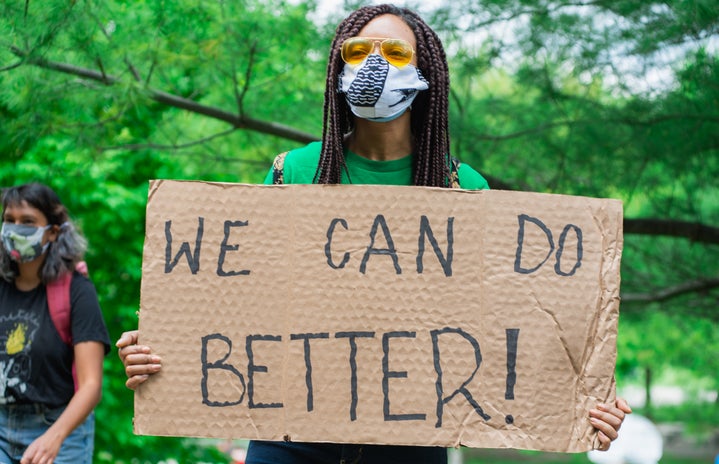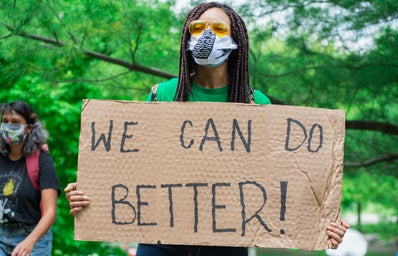Throughout the summer, young people reignited the fire behind a movement that began seven summers ago. The Black Lives Matter movement was established after the acquittal of George Zimmerman in the killing of an innocent Black teenager by the name of Trayvon Martin. Despite the years that have passed, the issue of racial injustice and the senseless murders of innocent Black people have persisted. The lack of systemic change targeting this issue, especially in terms of police brutality, have prompted young people from cities in every state to participate in large protests after another innocent Black man known as George Floyd was killed on camera by police officers.
While protestors still face suppression at these events in which they demand tangible equality, the conversation about the Black Lives Matter movement has garnered more positive attention over the internet compared to how it was a couple of years ago. More specifically, social media platforms were taken over with conversations about racial equality, police brutality and more recently, the abolition of the police. These topics bombarded many young people’s screens through masterposts on resources, the infamous black square trend, and posts about electoral participation within the context of the upcoming Presidential Election. Despite this, many have recently complained about the movement dying, since the influx of posts on social media have slowed down and people appear to have forgotten about these issues.
While many may think we can measure the strength of the movement through its visibility on social media, this is simply untrue. To this day, protests are still springing up around the country and efforts are being made by activists to continue fighting for the rights of Black people. As well, it’s important to realize that many people do not invest the appropriate amount of attention to the movement beyond social media posts. While social media posts may be beneficial toward educating and starting conversations with all types of people, it is crucial to realize that activism extends beyond the screen.
Here are some ways to support the movement beyond posts on social media and alternative methods of activism.
- Vote (kinda)
-
With only a handful of days left until the presidential election, many have persistently championed for activists to use their right to vote to uphold the change they want to see. SocialJusticeDoula is a black feminist thinker that recently shared her thoughts about the idea of voting during these times and in the context of the Black Lives Matter movement. While voting may seem like a definite way of supporting the issues we care about, SocialJusticeDoula, or Lutze, argues that it causes voters to compromise the values of the Black Lives Matter movement. It is important to recognize that while advocating for voting may be well intentioned, it could often silence the voices of Black people that do not believe in voting as a tactic towards achieving racial equality. Instead, we should uplift the Black activists that offer differing perspectives on how we can achieve social and racial equality beyond voting. Instead of relying on voting as a magical solution to erase our nation’s issues, we should recognize that the work that young people must do is far more difficult and time consuming. In Lutze’s words, voting should be recognized as a tool, but not the only tool in the fight within this movement.
- Mutual aid
-
In contrast to voting, mutual aid is a tool that directly helps out the communities that often face basic survival issues, such as housing, food or financial instability, which are often left uncared for by local governments. Mutual aid systems work on the pillars of volunteer work, transparency, and community building.
Mutual aid as defined by the Big Door Brigade is “a form of political participation in which people take responsibility for caring for one another and changing political conditions.” Rather than working on pressuring government officials as voting does, mutual aid aims to stand in solidarity with those left behind in our communities by addressing the basic survival needs of community members through social relations and close bonds. Instead of promoting change on a national scale through voting, mutual aid encourages people to directly help out members of their communities in order to affect real day-to-day change.
While it may seem time consuming, mutual aid is solely based on volunteer work and you can decide the ways that you can help according to your schedule. That could mean delivering groceries to people who live within food deserts once a week or something as simple as setting aside $20 monthly to donate to your local mutual aid fund. This form of activism is particularly important in sustaining the strength of the Black Lives Matter movement since communities of color are most impacted by these issues.
- Local community organizing
-
While it may seem daunting to get involved in such a large-scale movement, it’s simpler than you may think. In the same vein as the last tip, community organizing is a great tool to help out those impacted by racial injustice. While it may seem that you might have to start your own organization, there’s usually already organizations within your area that have experience doing local work to support marginalized communities.
For all my Floridian readers, Dream Defenders is a Florida organization that uplifts Black and Brown youth to build collective solidarity across the state and aims to provide basic survival needs and education to communities across the state.
Founded in April 2012 after the murder of Trayvon Martin, POC youth marched from Daytona Beach, FL to the location of Martin’s death in Sanford, FL. Since then, the organization has expanded to over 7 cities across the state, gained national attention and organized to bring incredible changes to the state, such as Amendment 4, which granted voting rights back to formerly incarcerated citizens.
I highly recommend getting involved with community organizations, such as Dream Defenders, in order to form a stronger connection with others that want to create lasting change in your area. It is not a permanent commitment and usually helps you learn about the issues that are currently not being addressed by elected officials.
- Support Black businesses
-
With more and more brands coming out with questionable, or sometimes plain racist, products and advertisements, many Black activists have demanded that activism should be aligned with our spending habits.
While it may be difficult to shift to completely Black-owned products, it is helpful to support Black-owned businesses as much as possible. Most of the time, there is probably a Black-owned brand that makes the product that you’re looking for, whether it be clothes, laundry detergent, or art.
There are a variety of ways to look for these brands, such as Twitter threads or specific search engines, such as TheNileList, which compile ecommerce brands for a variety of products. I recommend trying to knock out two birds with one stone by supporting small, locally owned Black businesses. This way, you can support Black members right in your community, which may not garner the same amount of attention as bigger brands.
While this is definitely not an exhaustive list, I hope that it provided you with alternative methods of getting involved in activism that is incredibly needed during these times. The belief that the Black Lives Matter movement is fading away is only true if you let it be. Hopefully, you can find the way to incorporate at least one of these tips into your activism!



